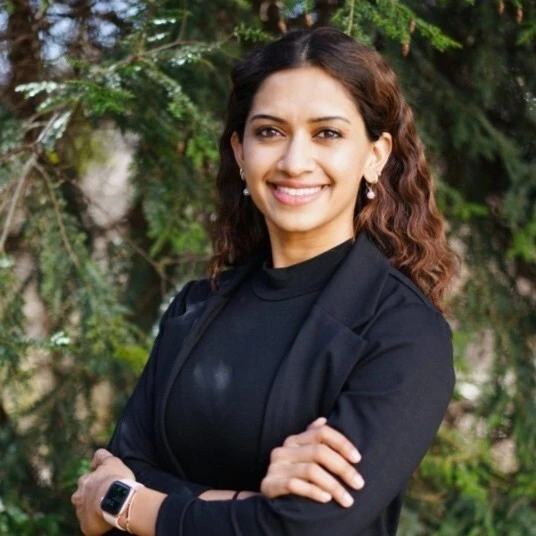

Description
On this episode of The Innovators Playbook Podcast, host Seth Narayanan sits down with Akshita Iyer, Founder & CEO of Ome Kitchen. From her neuroscience background to building a pioneering smart kitchen company, Akshita shares her journey of resilience, Shark Tank lessons, and the realities of scaling hardware innovation. This is a conversation about grit, bold thinking, and the future of connected living.
Akshita Iyer’s entrepreneurial path is anything but ordinary. What began as a personal problem, her mother’s Parkinson’s-related kitchen fire, turned into Ome Kitchen, a company redefining smart living with retrofit devices that bring intelligence to our most-used appliances. Featured on Shark Tank, Akshita has navigated the challenges of building a hardware company from the ground up, while balancing storytelling, fundraising, and manufacturing hurdles.
In this candid conversation with Seth Narayanan, Akshita shares insights on innovation, perseverance, and what it takes to build technology that truly matters. From AgeTech opportunities to the fragmented state of the smart home, she reflects on her journey, her vision, and what’s next.
Key Takeaways
From Neuroscience to Smart Kitchens
Akshita’s journey began far from the startup world. With a neuroscience degree from Duke and plans for medical school, entrepreneurship wasn’t on her radar, until her mother’s Parkinson’s diagnosis changed everything. After a kitchen fire sparked by an unattended stove, Akshita recognized a gap in home safety technology. This deeply personal moment pushed her to create Ome Kitchen, a company reimagining how we interact with one of the most important spaces in our homes.
Shark Tank: The Pitch, the Stress, and the Lessons
Appearing on Shark Tank just six months into building her product was both exhilarating and terrifying. From shattered prototypes during pre-pitches to last-minute call-ups, Akshita reveals the chaos and pressure behind the scenes. She even received an offer from Robert Herjavec, but turned it down. In hindsight, she reflects on why that decision forced her to grow, hustle, and seek out the right investors and mentors, shaping Ome Kitchen’s long-term success.
Building Hardware the Hard Way
Creating a smart retrofit knob for stoves sounds simple, but it required expertise in mechanical, electrical, software, and industrial engineering. Akshita candidly shares the frustrations of endless prototypes, supply chain breakdowns, and pandemic-era component shortages. From domestic small-batch manufacturing to eventually shifting overseas, the episode dives into the realities of scaling hardware and why perseverance is essential when innovation collides with logistics.
The Role of Passion and Perseverance
Founders often face daily moments of doubt, but Akshita highlights why personal connection to a problem makes the difference. For her, the memory of her mother’s accident kept her motivated through setbacks. She argues that while not every entrepreneur needs a personal story, having that emotional anchor can provide the grit to stay the course when things get tough.
Smart Homes and the AI Question
What’s the future of the connected home? While AI dominates tech conversations, Akshita sees the kitchen industry evolving more slowly. She explains why smart home tech remains fragmented across multiple apps, and why the promise of seamless integration has yet to be fulfilled. Still, she believes AI-powered automation and robotics in manufacturing could lower costs and transform how products like Ome’s are built.
The Untapped Potential of AgeTech
Through Ome’s journey, Akshita discovered a huge pull from senior living communities and aging-in-place markets. She explains how startups are uniquely positioned to solve for caregivers, families, and older adults, compared to slower-moving corporations. AgeTech, she argues, represents not only a massive market but also a chance to create deeply meaningful innovations that improve quality of life.
Entrepreneurship DNA: Learned or Born?
Is entrepreneurship a personality type or a learned skill? Akshita shares how her upbringing with a small-business father shaped her risk tolerance, but also emphasizes the importance of adaptability. Key traits she highlights include being coachable, reflective, and a strong storyteller, because founders are always pitching, whether to investors, employees, or customers. Her philosophy: anyone can become an entrepreneur if they’re willing to learn and stick with a problem worth solving.
What’s Next for Ome and Akshita
Having built Ome’s smart technology from zero to one, Akshita now envisions scaling from one to one hundred through strategic partnerships with appliance manufacturers. While Ome’s future may lie in integration with larger industry players, Akshita is also thinking about her own next chapter, leveraging her skills in corporate innovation, venture, or mentoring other founders. The episode closes with her reflections on identity, transition, and what passion looks like beyond a first company.





































